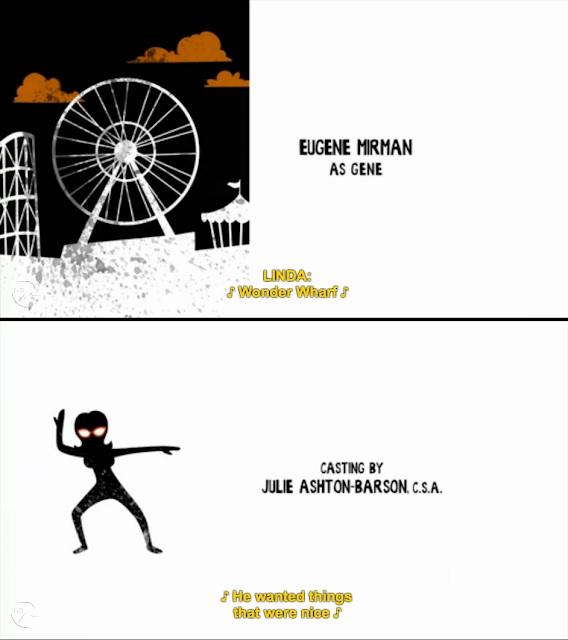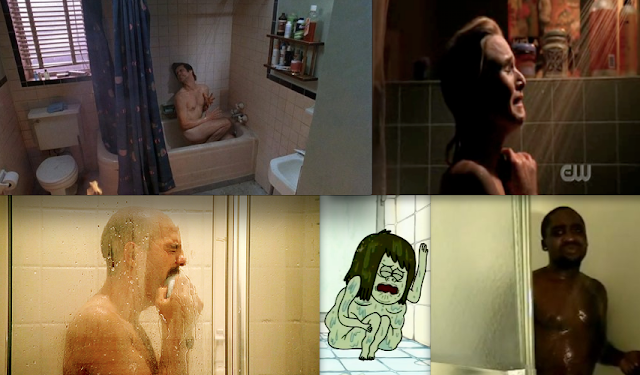 |
| Former Hannibal composer Brian Reitzell and the recently unretired Siouxsie Sioux (Photo source: EW.com) |
Brian Reitzell's eerie score music from Bryan Fuller's now-defunct Hannibal is completely bonkers. It's largely non-melodic and is more like sound FX rather than traditional-sounding score music. Think the horror equivalent of Gil Melle's similarly creepy and non-melodic synth score from The Andromeda Strain, but performed with bronze percussion instruments or old-fashioned oddities like a Newton's cradle--which, as the Hannibal composer and music supervisor pointed out to interviewer Hrishikesh Hirway on 99% Invisible, was chosen to represent the synapses firing inside the brain of FBI profiler and "empathy disorder" sufferer Will Graham (Hugh Dancy)--and a bullroarer (a piece of wood on a string, spun around to produce a roaring noise and used in Aboriginal religious ceremonies).
During Reitzell's Hannibal score albums (the kind of score albums that are made to be listened to only on headphones in order to catch all the various intricacies of Reitzell's nifty soundscapes), you're more able to notice how bonkers the sound design in Reitzell's score music is because your attention isn't drawn to either the gruesome prosthetic makeup on Raúl Esparza as the disfigured Frederick Chilton or the shots of misshapen corpses in grisly crime scenes that look like art installations created by the world's most fucked-up sculptors. A couple of lengthy excerpts from the score albums for Hannibal's first two seasons (the nearly 12-minute "Trou Normand" and the eight-minute "Tome-wan") are currently in rotation on AFOS, and, like Reitzell once warned about his own music from Hannibal, they're "not something to play alone in the dark while driving!"
Brian Reitzell's score for HANNIBAL is the greatest TV scoring job since Angelo Badalamenti's TWIN PEAKS.
— Matt Zoller Seitz (@mattzollerseitz) May 3, 2014
 |
| Will Graham deduces why a murdered musician was transformed into a cello in the Hannibal episode "Fromage." |
Aside from the occasional use of Bach and Mozart compositions as source cues (Hannibal Lecter may be a cannibal, but his tastes in dinner music lean towards the classy and erudite), Reitzell refrained from conventional melodies for so long that when the time came for Fuller and Reitzell to close the book on Hannibal, Reitzell wanted to say thank you to the show's small but passionate audience--known as the Fannibals--for expressing their love for the show by finally treating them to a conventional melody at the end of "The Wrath of the Lamb," the series finale. The final six episodes of Hannibal were loaded with fan service, whether they were fast-forwarding the series timeline to retell Red Dragon, the 1981 Thomas Harris novel that started it all and introduced Dr. Lecter, heightening the homoerotic tension between Will and Mads Mikkelsen's Hannibal (but, as Hannibal regular Scott Thompson points out, never really getting them to consummate it) or gifting the Fannibals with an original song that intriguingly carries several different meanings, from the most obvious one, the bizarre love between Will and his frenemy, to the possibility that the song is also about the post-NBC future of the show itself.
I'm no Goth, and I've never cared for Goths, but I've always liked the music of Siouxsie and the Banshees, whose songs have been discovered by a whole new audience after The Weeknd sampled the band's "Happy House" for "House of Balloons/Glass Table Girls" back in 2011. "Love Crime," Siouxsie Sioux's first recording in eight years, is a perfect way for Reitzell--a Banshees fan who co-wrote the tune with Sioux, a fan of Fuller's show--to musically conclude Hannibal, as well as one of Sioux's best songs, a hypnotic ballad in the mold of "Face to Face," the Siouxsie and the Banshees tune that was such a musical highlight of Batman Returns.
The Sioux/Reitzell tune, which I've added to AFOS rotation this week, is also a far better Bond song than "Writing's on the Wall," Sam Smith's official Bond theme for Spectre. Even though "Love Crime" is a ballad and the "I will survive" refrain is an especially resonant and bittersweet lyric for viewers and TV critics who are heartbroken over NBC's cancellation of Hannibal and are hoping Fuller will get his wish to someday revisit the Harris characters in some form or other, "Love Crime" is thankfully devoid of the sappiness of "Whining's on the Wall."
Like "Face to Face" before it, "Love Crime" feels like the Bond song Sioux always wanted to perform but will never get to because she's too weird for the Top 40 radio-obsessed Broccolis. Sioux isn't quite Sade. Now Sade's the performer I've always wanted for a Bond theme, more so than anyone else, even Sioux--"Smooth Operator" would have been perfect for opening a Roger Moore-era Bond flick--yet the Broccolis have stupidly ignored Sade all these years. But with "Love Crime," Sioux proves she was always worthy to join the likes of Shirley Bassey and Shirley Manson. She and Reitzell also prove what a folly several of the Broccolis' choices for Bond main title themes have been ever since Lulu's voice cracked at the end of 1974's "The Man with the Golden Gun," and that high note Lulu clearly had trouble powering through helped cause "The Man with the Golden Gun," a tune even the late John Barry admitted to being ashamed of producing, to become the first of several main title themes in the Bond catalog that are painful to listen to.
That's not all that "Love Crime" surpasses. Will's confrontation with serial killer Francis Dolarhyde (oddly spelled as Dollarhyde by Michael Mann and played by Tom Noonan) to the tune of Iron Butterfly's "In-A-Gadda-Da-Vida" during 1986's Manhunter--the first time Red Dragon was brought to the screen--remains a classic musical moment in a Mann movie, especially when Iron Butterfly drummer Ron Bushy's drum roll accompanies the William Peterson version of Will badassedly smashing through the window to stop Dollarhyde. Sioux and Reitzell actually recorded "Love Crime" way before "Wrath of the Lamb" episode writers Fuller, Steve Lightfoot and Nick Antosca came up with the scenes "Love Crime" ended up being paired with in the final cut: Will and Hannibal fighting Dolarhyde (now back to one L and played by Richard Armitage) together; a badly wounded Will experiencing a baptism in blood and taking a gutshot Hannibal along with him in his plunge off the cliff; and a drugged Bedelia Du Maurier (Gillian Anderson) being served her own severed and roasted leg by an unknown dinner guest (could that guest be her former patient and partner-in-crime Hannibal?). But after hearing what Sioux and Reitzell accomplished with "Love Crime"--and seeing how beautifully the tune fits with those striking images of Dolarhyde, Will, Hannibal and Bedelia--I prefer "Love Crime" over the drunkenly sung "In-A-Gadda-Da-Vida" as cathartic music for the defeat of Dolarhyde.
 |
| (Photo source: endlessly fascinated) |
The lyrics during "In-A-Gadda-Da-Vida" were always dumb anyway. They're the "I'mma take her ass down when she bring her friend around/Fuck 'em both like ayo" of 20-minute makeout songs for white people. The lyrics are so distractingly inane they make you wish Mann's music editor carved up "In-A-Gadda-Da-Vida" into an instrumental like how Hannibal carves up his victims for dinner.
Plus "In-A-Gadda-Da-Vida" doesn't have the aforementioned layers of meaning "Love Crime" carries. In addition to the subject matter of the bond between Will and Hannibal (notice the double meaning of "I will," which could also be interpreted as "I, Will"), "Love Crime" is also about Hannibal and Bedelia. Fuller pointed out to TV critic Alan Sepinwall that "what's so fun is that... we hear [Sioux] say, 'I will survive, I will survive,' as we're pushing in on Bedelia, and that could mean she's singing from Hannibal's perspective and it means he has survived and will eat this woman now, or Bedelia's point of view that it's like, 'You may have cut off this leg, but I've got this fork and I'm gonna do some damage before it's done.'"
"Love Crime" could also be interpreted as an anthem for the show itself and its existence in the "deadly game" known as network TV. I'm amazed that a show with so much gore, cannibalism, dark humor and bizarre dream sequences and such a thoughtful approach to mortality and morality managed to last this long on a network like NBC.
Three seasons are a ripe old age for a Fuller show about the subject of death. It's the longest a Fuller creation has lasted on TV (Wonderfalls, the first time many of us developed a crush on Hannibal regular Caroline Dhavernas, lasted only one season, while Pushing Daisies managed to stay alive for two, just like Dead Like Me, which Fuller also created, but he quit Dead Like Me early on due to creative differences). Fuller, who devised the ending of "The Wrath of the Lamb" so that it could be both a satisfying conclusion and the start of a possible new chapter, may think that "the most interesting chapter of Will Graham's story has yet to be told"--Sioux's "I will survive" refrain is basically what must be playing inside Fuller's head whenever he tantalizes the Fannibals with the possibility of a miniseries or movie where Dancy and Mikkelsen would reprise their roles--but personally, I think Will's story ended at the right point.
Plus the continuation of Hannibal would have gotten in the way of what I think Fuller--who's now showrunning the Starz adaptation of Neil Gaiman's American Gods and is attempting to revive Steven Spielberg's Amazing Stories--is destined for: returning to the franchise that gave him his start, Star Trek, and bringing it back to TV (c'mon, CBS All Access, let Fuller have the conn). Three seasons are the perfect lifespan for shows about serial killers who are superhumanly able to get away with so much heinous shit for so long, as opposed to the 38 seasons of Dexter and the 67 seasons of Criminal Minds. Sometimes the feasts with smaller portions are the better ones.
"Love Crime" is now in rotation during the AFOS blocks "AFOS Prime" and "New Cue Revue." Lakeshore Records will release the Hannibal Season 3 Volume 1 and Volume 2 score albums digitally this Friday and on CD in early 2016, just in time for yesterday's DVD and Blu-ray debut of Hannibal's third and final season.
 |
| (Photo source: Eliosu) |































